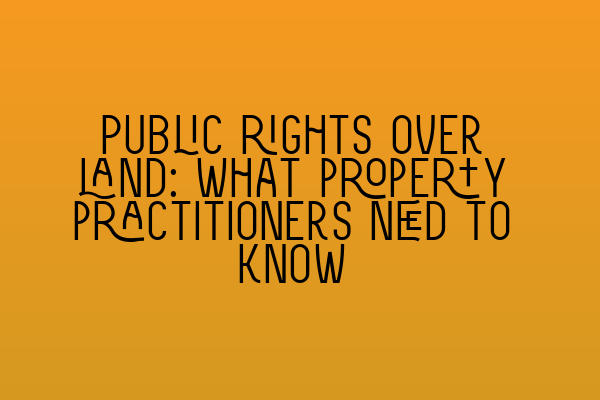Public rights over land: What property practitioners need to know
As a property practitioner, it is crucial to have a thorough understanding of public rights over land. These rights can have a significant impact on property transactions, planning applications, and development projects. In this blog post, we will explore the key aspects of public rights over land and discuss how they can affect your work as a property lawyer.
What are public rights over land?
Public rights over land refer to the legal rights that individuals or the general public have to use and access certain areas of land. These rights are established through various legal mechanisms and can include rights of way, public footpaths, common land, village greens, and access to amenities such as parks and beaches.
Understanding the different types of public rights
To navigate public rights over land effectively, it is essential to have a clear understanding of the various types of rights that exist:
1. Rights of way: Rights of way grant individuals or the public the legal right to pass through private land. These can be granted by law, custom, or by agreement with the landowner.
2. Public footpaths: Public footpaths are designated paths that allow the public to walk through private land for recreation or transportation purposes. These paths are often marked with signs or stiles and are protected by law.
3. Common land: Common land refers to areas of land that are owned collectively by a community or the public. Common land is typically subject to specific rights and restrictions, which aim to protect the shared interests of the community.
4. Village greens: Village greens are spaces within a village or community that are traditionally used for recreation or community events. These areas are often protected by law and cannot be enclosed or developed without the consent of the community.
How public rights over land impact property transactions
Public rights over land can have a significant impact on property transactions, especially when it comes to land that is subject to public rights. It is crucial to identify and investigate these rights during the due diligence process to ensure that the property’s intended use aligns with the existing rights.
For example, if you are acting for a buyer who intends to develop a piece of land, you need to determine whether there are any public footpaths or rights of way that could restrict the planned development. Additionally, if the property includes common land or village greens, you must ensure that the buyer is aware of the restrictions and obligations associated with these areas.
Addressing public rights over land in planning applications
When submitting planning applications, property practitioners must consider the impact of public rights over land on the proposed development. Local authorities will typically require evidence that public access and rights have been appropriately considered, and may even consult local communities for their input on the matter.
It is essential to conduct a comprehensive review of the site’s public rights, consult with relevant authorities, and address any concerns that may arise during the planning process. Failing to account for public rights can result in delays, objections, or even legal challenges to the development.
Working with public bodies and stakeholders
Public rights over land often involve engaging with various public bodies and stakeholders throughout the course of a property transaction or development project. Effective communication and collaboration with these entities are crucial to ensure compliance with legal requirements and avoid potential disputes.
When working with public bodies and stakeholders, property practitioners should be proactive in seeking guidance, providing accurate information, and addressing any concerns that may arise. Building positive relationships with these parties can contribute to the successful outcome of your client’s matter.
Seeking specialist advice
Given the complexities and potential ramifications of public rights over land, property practitioners should consider seeking specialist advice when dealing with properties that are subject to such rights. Working with experienced property lawyers who have expertise in land law can provide valuable insights and ensure that all legal requirements and considerations are met.
Conclusion
Public rights over land are a fundamental aspect of property law that property practitioners must familiarize themselves with. Understanding the different types of public rights, their impact on property transactions and development projects, and knowing how to navigate and address these rights is crucial for providing exceptional legal service to clients.
To enhance your knowledge and preparation for the SQE exams, it is also beneficial to explore related articles and resources, such as the SQE 1 Practice Exam Questions, SQE 1 Practice Mocks FLK1 FLK2, SQE 2 Preparation Courses, SQE 1 Preparation Courses, and SRA SQE Exam Dates.
By staying informed and continuously learning about public rights over land, property practitioners can effectively navigate the intricacies of property law and provide the best possible advice and support to their clients.
